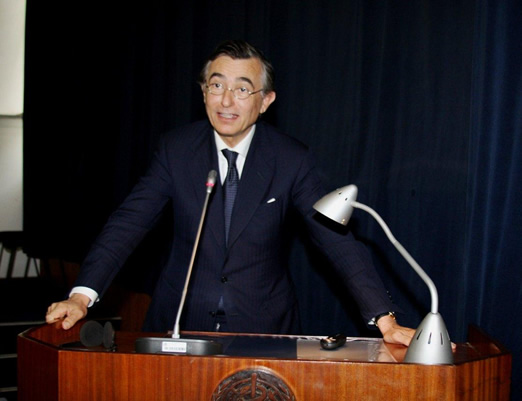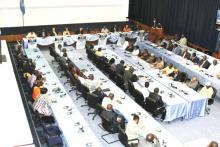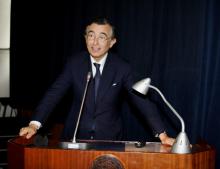Dr Douste-Blazy calls for globalisation of solidarity to address health challenges
 Brazzaville, 14 June 2013 – The Special Adviser to the Secretary-General of the United Nations on Innovative Financing for Development, and Chairman of the Executive Board of UNITAID, Dr Philippe Douste-Blazy has called for globalisation of solidarity to address health challenges facing the world. He was speaking at the end of a two-day official visit to the Regional Office of the World Health Organization in the African Region in Brazzaville, Congo.
Brazzaville, 14 June 2013 – The Special Adviser to the Secretary-General of the United Nations on Innovative Financing for Development, and Chairman of the Executive Board of UNITAID, Dr Philippe Douste-Blazy has called for globalisation of solidarity to address health challenges facing the world. He was speaking at the end of a two-day official visit to the Regional Office of the World Health Organization in the African Region in Brazzaville, Congo.
Dr Douste-Blazy said the increase in health needs and the decrease in Official Development Aid (ODA) have resulted in a situation he described as the ‘Scissors effect”. This «scissors effect» between public resources and the need to finance international solidarity for every human being is a major challenge and requires us to fulfill a historical responsibility.
He told the audience that during the last two decades, the world has experienced globalization of the economy and that of communication but not globalisation of solidarity. The globalisation of the economy without the globalisation of solidarity is a way of courting disaster.
“We will not emerge from this current crisis unless we very rapidly purge these moral failings of globalisation. Unless we replace them at the heart of our social contract with a sense of justice and the idea of humanity,” Dr Douste-Blazy added.
He said one US dollar tax levied on plane tickets is making significant contribution to people’s health and called on African leaders to implement innovative financing mechanisms to secure adequate resources for health development. The Chairman of the Executive Board of UNITAID, congratulated Dr Luis Sambo, on WHO’s work in the African region to improve people’s health.
In his remarks the Dr Sambo, highlighted the health challenges facing the African Region. He said: “Progress towards the attainment of health related MDGs are very slow mainly due to the weakness of health systems as a result of inadequate health financing”.
He observed that only five countries in the Regions have allocated 15% of national budget to health and nearly 50% of people in the Region do not have access to essential medicines. He said shortage of skilled health workforce, high out of pocket expenditures and the allocation of inadequate resources for health are challenges that need to be seriously addressed.
The Regional Director pointed out that UNITAID’s innovative financing model presented by Dr Douste-Blazy is relevant because it is already a proven mechanism that is making a positive impact for example in increased access to antiretroviral pediatric medicines
“This is a very small individual contribution but on the whole, it can generate financial resources that will minimize the suffering of poor and marginalized people and promote their health and quality of life”, said Dr Sambo.
The visit of Dr Douste-Blazy and his delegation was aimed at expanding collaboration between UNITAID and WHO in the African Region particularly in exploring ways of strengthening support to countries in the reduction of sickness and death due to HIV, malaria and tuberculosis.
For more information, please contact:
Collins Boakye-Agyemang + 4724139420 E-mail: Boakyec [at] afro.who.int
Flavienne Issembe + 4724139352 E-Mail : Issembef [at] afro.who.int
----------------------------------------------------------------------------------------------------------------------
An interview with Dr Philippe Douste-Blazy, Chairman of the UNITAID Executive Board at the WHO Regional Office for Africa




